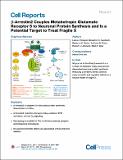| dc.contributor.author | Auerbach, Benjamin D. | |
| dc.contributor.author | Lefkowitz, Robert J. | |
| dc.contributor.author | Stoppel, Laura Jane | |
| dc.contributor.author | Senter, Rebecca K | |
| dc.contributor.author | Preza, Anthony R. | |
| dc.contributor.author | Bear, Mark | |
| dc.date.accessioned | 2017-09-29T19:28:31Z | |
| dc.date.available | 2017-09-29T19:28:31Z | |
| dc.date.issued | 2017-03 | |
| dc.date.submitted | 2017-01 | |
| dc.identifier.issn | 2211-1247 | |
| dc.identifier.uri | http://hdl.handle.net/1721.1/111663 | |
| dc.description.abstract | Synaptic protein synthesis is essential for modification of the brain by experience and is aberrant in several genetically defined disorders, notably fragile X (FX), a heritable cause of autism and intellectual disability. Neural activity directs local protein synthesis via activation of metabotropic glutamate receptor 5 (mGlu 5 ), yet how mGlu 5 couples to the intracellular signaling pathways that regulate mRNA translation is poorly understood. Here, we provide evidence that β-arrestin2 mediates mGlu 5 -stimulated protein synthesis in the hippocampus and show that genetic reduction of β-arrestin2 corrects aberrant synaptic plasticity and cognition in the Fmr1 −/y mouse model of FX. Importantly, reducing β-arrestin2 does not induce psychotomimetic activity associated with full mGlu 5 inhibitors and does not affect G q signaling. Thus, in addition to identifying a key requirement for mGlu 5 -stimulated protein synthesis, these data suggest that β-arrestin2-biased negative modulators of mGlu 5 offer significant advantages over first-generation inhibitors for the treatment of FX and related disorders. | en_US |
| dc.description.sponsorship | National Institutes of Health (U.S.) (Grant R21NS087225) | en_US |
| dc.description.sponsorship | National Institutes of Health (U.S.) (Grant 2R01HD046943) | en_US |
| dc.description.sponsorship | National Institutes of Health (U.S.) (Grant R01MH106469) | en_US |
| dc.publisher | Elsevier | en_US |
| dc.relation.isversionof | http://dx.doi.org/10.1016/J.CELREP.2017.02.075 | en_US |
| dc.rights | Creative Commons Attribution-NonCommercial-NoDerivatives 4.0 International | en_US |
| dc.rights.uri | https://creativecommons.org/licenses/by-nc-nd/4.0/ | en_US |
| dc.source | Publisher | en_US |
| dc.title | β-Arrestin2 Couples Metabotropic Glutamate Receptor 5 to Neuronal Protein Synthesis and Is a Potential Target to Treat Fragile X | en_US |
| dc.type | Article | en_US |
| dc.identifier.citation | Stoppel, Laura J. et al. “β-Arrestin2 Couples Metabotropic Glutamate Receptor 5 to Neuronal Protein Synthesis and Is a Potential Target to Treat Fragile X.” Cell Reports 18, 12 (March 2017): 2807–2814 © 2017 The Author(s) | en_US |
| dc.contributor.department | Picower Institute for Learning and Memory | en_US |
| dc.contributor.mitauthor | Stoppel, Laura Jane | |
| dc.contributor.mitauthor | Senter, Rebecca K | |
| dc.contributor.mitauthor | Preza, Anthony R. | |
| dc.contributor.mitauthor | Bear, Mark | |
| dc.relation.journal | Cell Reports | en_US |
| dc.eprint.version | Final published version | en_US |
| dc.type.uri | http://purl.org/eprint/type/JournalArticle | en_US |
| eprint.status | http://purl.org/eprint/status/PeerReviewed | en_US |
| dc.date.updated | 2017-09-27T14:23:51Z | |
| dspace.orderedauthors | Stoppel, Laura J.; Auerbach, Benjamin D.; Senter, Rebecca K.; Preza, Anthony R.; Lefkowitz, Robert J.; Bear, Mark F. | en_US |
| dspace.embargo.terms | N | en_US |
| dc.identifier.orcid | https://orcid.org/0000-0001-6673-4988 | |
| mit.license | PUBLISHER_CC | en_US |
| mit.metadata.status | Complete | |
